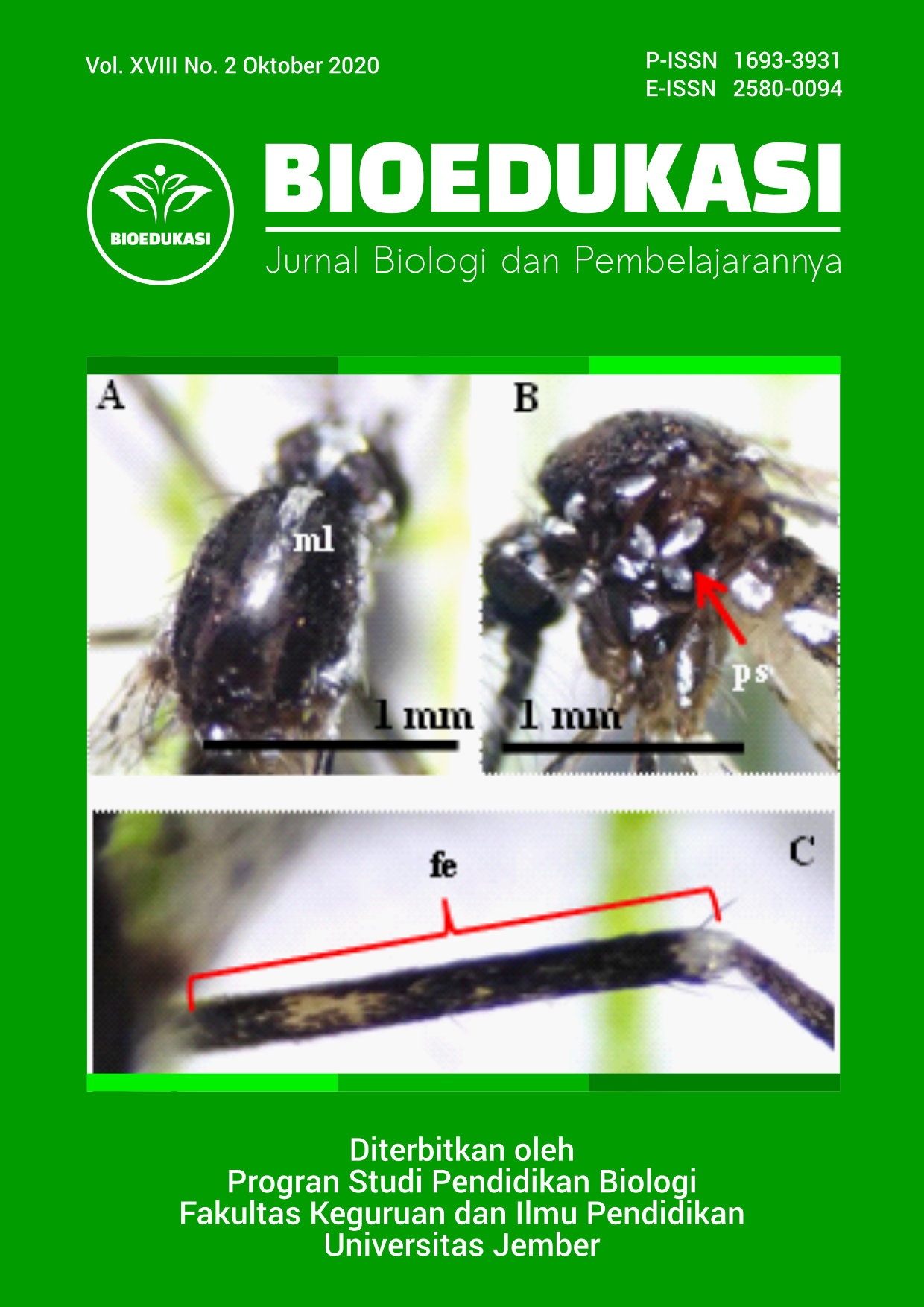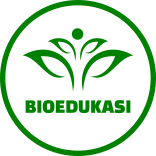DEVELOPMENT OF BRAIN-BASED LEARNING MODEL BASED ON PROBLEM-BASED LEARNING (BBL-PBL) TO IMPROVE CRITICAL THINKING AND LEARNING OUTCOMES
DOI:
https://doi.org/10.19184/bioedu.v18i2.17174Keywords:
Biology Learning, Brain-Based Learning, Problem-Based Learning, Critical Thinking, Learning OutcomesAbstract
The 21st -century learning demands students’ that have critical thinking skills. The learning model of Brain-Based Learning (BBL), combined with the approach of Problem-Based Learning (PBL), is an alternative model that adjusts the critical thinking skils. The objective of this research was to generate a valid, practical, and effective BBL-PBL learning model. This research was research and development using the ADDIE model, consisting of analysis, design, develop, implement, and evaluate. The study was implemented on the tenth-grade students of Rambipuji Senior High School, Jember, Indonesia, in the academic year of 2019/2020. The data collection techniques used were validation of products and test methods, interviews with the teachers, the questionnaire responses of teachers and students, and class observations. The results of the validity of the product were 91.4% as very valid category. The results of the cognitive model’s effectivenest were of 0.81 as high category, the psychomotor aspects were 82 as fair category, and the critical thinking skills were of 85 as excellent category. The practicality results were obtained from the questionnaire responses of the teachers and the students, respectively by 91.2% and 86% which are both excellent categories.
Downloads
References
Boso, C. M., Merwe, A. S. V. D., & Gross, J. (2019). Critical Thinking Skills of Nursing Students: Observations of Classroom Instructional Activities. Nursing Open Wiley, 17(7), 581-588.
Buah, E., and Akuffo, A. F. (2017). The Science Topics Perceived Difficult by Junior High School Students at Techiman North District: Effects On the Teaching and Learning of Science. Imperial Journal of Interdisciplinary Research, 3(1), 503-509.
Chai, C. S., & Kong, S. C. (2017). Professional Learning for 21st Century Education. Journal of Computers in Education, 4 (1), 1-4.
Dennison, P. E., & Dennison, G. E. (2005). Simple Activities for Whole Brain Learning. USA: Edu kinesthetic.
Duch, B. J., Groh, S. E., & Allen, D. E. (2001). The Power Of Problem-Based Learning: A Practical "How To" for Undergraduate Teaching Courses in Any Discipline. United States: Stylus Publishing LLC.
Dunn, R., & Griggs, A. S. (2000). Practical Approaches to Using Learning Styles in Higher Education. London: Bergin & Garvey.
Ennis, R. H. (2011). The Nature of Critical Thinking: An Outline of Critical Thinking dispositions and Abilities. Cambridge: Sixth International Conference on Thinking at MIT.
Fitriani, A., Zubaidah, S., Susilo, H., & Muhdhar, M. H. I. A. (2020). PBLPOE A Learning Model to Enhance Students' Critical Thinking Skills and Scientific Attitudes. International Journal of Instruction, 13(2), 1-18.
Ghalley, L.R., & Rai, B. M. (2019). Factors Influencing Classroom Participation: A Case Study of Bhutanese Higher Secondary Student. Asian Journal of Education and Social Studies, 4(3), 1-14.
Handayani, B. S., & Corebima, A. D. (2017). Model Brain-Based Learning (BBL) and Whole Brain Teaching (WBT) in Learning. International Journal of Science and Applied Science: Conference Series, 1(2), 153-161.
Handayani, E. M. T., Prihatin, J., & Fikri, K. (2018). The Development of Collaborative Learning Talking Chips Based On Brain-Based Learning (BBL) for The Junior High School Science in The Agroecosystem Area. Pancaran Pendidikan, 7(4), 71-84.
Jalil, M., Ngabekti, S., & Susilowati, S. M. E. (2016). Pengembangan Pembelajaran Model Discovery Learning Berbantuan tips Powerpoint Interaktif pada Materi Interaksi Makhluk Hidup dengan Lingkungan. Jurnal Refleksi Edukatika, 6(2), 130-137.
Jensen, E. (2008). Brain-Based Learning The New Paradigm of Teaching. London: Corwin Press.
Khalil, A. H., Elnagar, B. E. E., & Awad, M. E. (2019). The Effect of Brain-Based Learning on Developing Some Speaking Skills of Egyptian EFL Secondary School Students. International Journal of Environmental & Science Education, 14(3), 103-116.
Komarudin, N., Rosmawati, Suherman, B. S., Anggoro. (2019). The Effect of Algebra Finger- Brain Gym Based Method to Improve Student Learning Outcomes. EduMa Mathematics Education Learning and Teaching, 8 (2), 80- 88.
Kristanto, A., Rahayu, C. A. P., & Wibawa, S. C. (2019). The Development of Augmented Reality Media for Optical Physics Subject in Learning Materials at SMK Multimedia Devices. International Conference on Education Technology, 372(2), 198-206.
Laksana, A. D. S, Prihatin, J., & Novenda, I. L. (2019). The Development of Collaborative Learning Based on Brain-Based Learning (BBL) Model for The Junior High School Science Learning in The agroecosystem Area. Bioedukasi, XVII(2), 82-91.
Lin, C., Li, B., & Wu, Y.J. (2018). Existing Knowledge Assets and Disruptive Innovation: The Role of Knowledge embeddedness and specificity. Sustainability, 10(342), 1-15.
Lukman, I., Damanik, M., Silaban, S., & Kembaren, A. (2019). Development of Problem Based Learning Student Worksheets in Learning Innovative Concept of Chemistry for the Senior High School Students. Journal of Transformative Education and Educational Leadership, 1(1), 23-28.
Mertha, Y. L. A., Mudakir, I., & Prihatin, J. (2019). The Development of Analytic Team Collaborative Learning Model Based on Brain-Based Learning (BBL) for Junior High School Science Learning in Agroecosystem Areas. Bioedukasi, XVII(1), 1-10.
Nissen, J. M., Talbot, R. M., Thompson, A. N., & Dusen, B. V. (2018). Comparison of Normalized Gain and Cohen's d for Analyzing Gains on Inventory Concept. Journal of the American Physical Society, 1(12), 45-60.
Roffiq, A., Qiram, I., & Rubiono, G. (2017). Media Musik dan Lagu pada Proses Pembelajaran. Jurnal Pendidikan Dasar Indonesia, 2(2), 35-40.
Rowland, A. A., Knekta, E., Eddy, S., & Corwin, L. A. (2019). Defining and Measuring Students' Interest in Biology: An Analysis of the Biology Education Literature. CBE Life Sciences Education, 18(34), 1-14.
Saleh, S., & Mazlan, A. (2019). The Effects of Brain-Based Teaching with the I-Think Maps and Brain Gym Physics Approach Towards Understanding. JPII, 8(1), 12-21.
Samad, M. A., & Mangindara. (2019). The Influence of Learning Model, School Accreditation and Emotional Learning Outcomes Ability on Mathematics in the Grade VIII Students of Junior High School in Gowa District. ICONSS Proceeding Series, 5(3), 1-10.
Sani, A., Rochintaniawati, D., & Winarno, N. (2018). Enhancing Students' Motivation Through Brain-Based Learning. International Conference on Mathematics and Science Education, 1157(022059), 1-6.
Santrock, J. W. (2011). Educational Psychology. New York: Mc Graw Hill.
Sriyansyah, S. P., & Azhari, D. (2017). Addressing an Undergraduate Research Issue About Normalized Change for Critical Thinking Test. Indonesian Journal of Science Education, 6(1), 138-144.
Susani, D. E., Ngabekti, S., & Priyono, B. (2019). The Effect of Problem-Based Learning for Environmental Change Concept on Students' Learning Outcomes. Journal of Biology Education. 8 (1): 8-14.
Tan, O. S. (2004). Enhancing Thinking Through Problem-Based Learning Approaches: International Perspectives. Singapore: Cengage Learning.
Wibowo, Y. G., & Sadikin, A. (2019). Biology in the 21st-Century: Transformation in Biology Science and Education in Supporting the Sustainable Development Goals. JPBI, 5(2), 285-296.
Winarno, S., Muthu, K. S., & Ling, L. S. (2018). Direct Problem-Based Learning (DPBL): A Framework for Integrating Direct Instruction and Problem-Based Learning Approach. International Education Studies, 11(1), 119-126.






